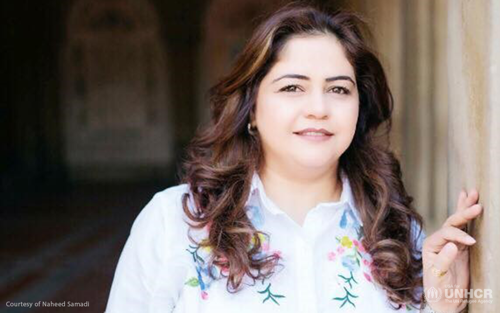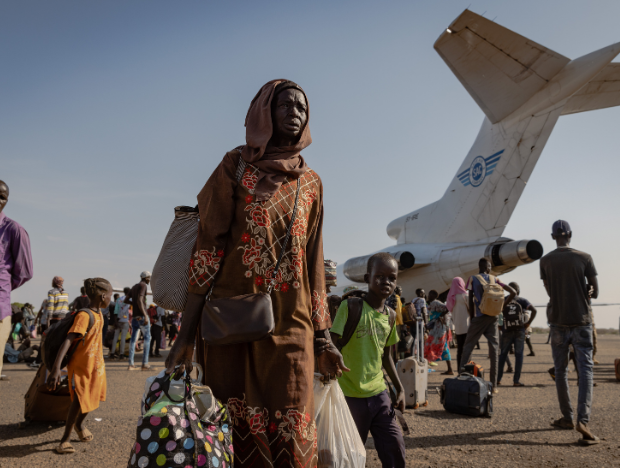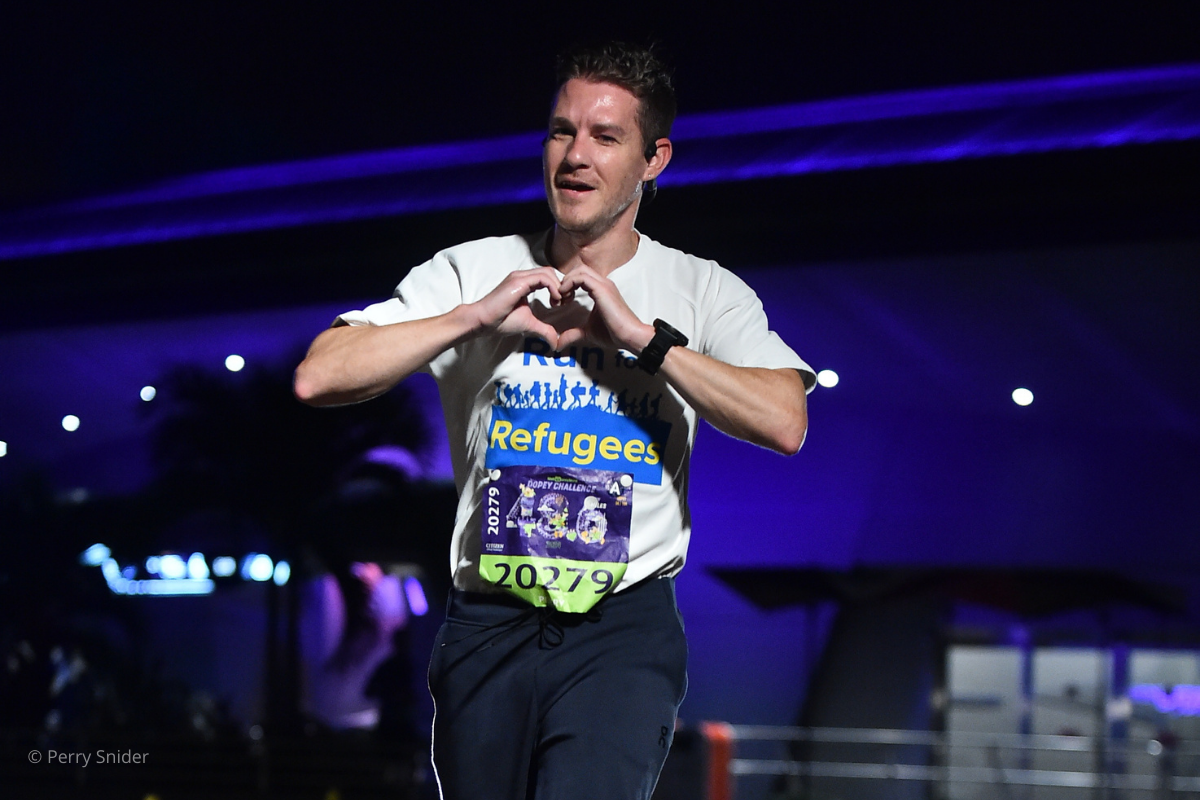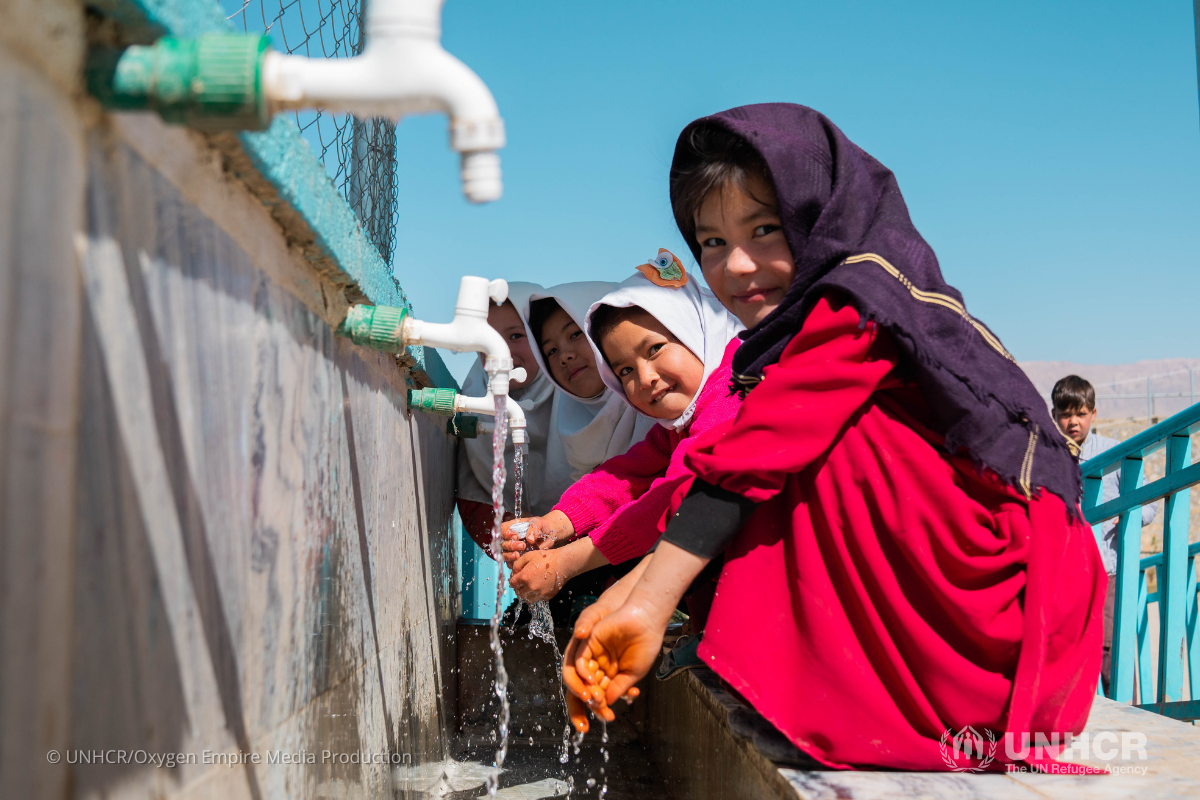Former Afghan Refugee Finds Purpose in Advocating for Newcomers
Naheed Samadi Bahram is the U.S. Country Director of Women for Afghan Women and a former refugee from Afghanistan who came to the U.S. in 2006.
USA for UNHCR Senior Director of Advocacy and Community Engagement Jennifer Simon spoke with Naheed about her recent work with newly arrived Afghan families, her advocacy for women’s rights and how equal access to education changed the course of her life.

What was your upbringing like in Afghanistan and Pakistan and how did you come to the U.S.?
I was 10 years old when my mother was killed in a rocket explosion in Kabul during the civil war in 1990. There were bombs everywhere, and our house was bombed. The next day we decided to leave Afghanistan. I was 11 at that time. We moved from Afghanistan to Pakistan and we were refugees in Pakistan for 15 years.
I understand that when you were growing up your parents were supportive of you and your sisters’ pursuing education. That was unusual, wasn’t it?
My parents had never been to school in their life, but my father knew that education and the independence of his daughters was very important to him. And in the part [of the country] where my father is from none of the girls ever graduated from college but all of my sisters and brothers went to university. Everyone was saying “how will you allow your daughters to go to university?” That always happened -- pushback from communities and family. But my father said, “nobody dare talk to me about my daughters’ education.” And this coming from him meant a lot – it was huge.
Also, my mother, not being educated at all, would not miss a parent-teacher meeting - not only for us [but also] for our cousins at the same school. For somebody who had never been to school herself, that’s a lot to do.
In addition to criticism from other family and community members, what other obstacles did you have to overcome in order to stay in school?
There was a lot. The war in Afghanistan was going on. People were scared to send their kids to school because they could have been bombed coming to and from school. There were rockets dropped everywhere.
I can imagine the kids in Afghanistan right now not being able to go to school. I have been through that. And it was not easy, it was definitely not easy.
Education for girls and women is something that is very important to me. That is one factor that changed so much in my life. If I was not educated, what would I be today?
What about your experience in school when you were a refugee living in Pakistan?
Because we were Afghan refugees, we were not able to join private schools in Pakistan - we were attending schools that were provided for Afghan refugees in Peshawar. We had to walk miles from our school to home. Our classroom in Peshawar was not a proper room and there was only one fan to keep the entire class cool. And the classrooms were not in the best shape. The class was divided by cardboard, and you could easily listen to what the other class was learning at the same time.
But then we made it. But we were able to get the education and, even in that situation, be able to get into university and graduate.
Going through all of that hardship makes you realize not to take things for granted. There is no degree that will teach you the life experience that the majority of us Afghans went through.
After 15 years in Pakistan, how were you able to come to the U.S.?
I came to the U.S. in July 2006. My husband was here and I came on a student visa because I wanted to finish my education. The universities were closed in Peshawar -- the Taliban first closed down the schools in Afghanistan, and a few years after that our schools were also closed in Pakistan.
[At the time] I was very homesick and I looked to organizations that worked with Afghan communities. That is how I found Women for Afghan Women. In a matter of a month, I started volunteering five days a week even while I was going to school.
In addition to connecting you to Afghans and the community, what interested you about the work that Women for Afghan Women does, particularly around women’s rights and advocacy?
Before I was even 17 years old I started teaching ESL classes in Pakistan at the refugee woman’s center for English and computer programming. During that time, I noted the inequality – the lack of women’s education, how they were treated differently than men and domestic violence. Those were issues that were bothering me but I was really too young to understand because I was in that culture.
When you are in Pakistan or Afghanistan you feel that people are lucky to be in the United States because they have the right to education and they do not need to be scared of war. But when I came here, I saw a different side of the United States that I would have never imagined. I found girls who had been born and raised in the United States, in Queens, who weren’t going to school. That was not very different than what I had experienced in Pakistan or in Kabul. And I saw domestic violence and inequality, not only in the Afghan immigrant community but in any community in the United States.
Can you talk about Women for Afghan Women’s work in addition to advocacy? In what ways are you supporting Afghan communities in Afghanistan and in the U.S.?
Women for Afghan Women is – or I should say was because of the situation now – the largest women-led organization to advocate for Afghan women’s rights globally. We have over 1,200 local Afghan staff inside of Afghanistan and we work specifically with survivors of abuse and violence.
In the United States, we are the only Afghan-led organization that provides training and services to Afghan immigrants who are survivors of violence. We have been providing services for over 20 years that include ESL classes, preparation for citizenship, preparation for the driving permit test and more.
About 85 percent of Afghan women who attend our ESL classes have never been to school in their life, so this is the very first classroom for them. And within a couple of years, you will see them going to our citizenship classes, becoming citizens, being able to drive on their own, being able to attend their own doctor’s appointments without their husbands and without their children having to act as their interpreters.
We also have a youth education program, social service programs for when someone needs to apply for SNAP or Medicare or Medicaid, and programs to address complicated domestic violence cases.
How has your work changed since last fall, with tens of thousands of Afghans being relocated to the U.S.?
There is [need for] services beyond what we used to do. Since August of last year, we have been doing resettlement work, providing temporary housing, transportation, distribution of household items and personal hygiene kits. We work with the resettlement agencies to try to fill the gaps in the services they provide.
We have also been doing education sessions on domestic violence for the Afghan community letting them know that abuse and violence are wrong wherever you are, and we also need to explain what the difference will be [under the law] if it happens in this country.
What keeps you going in such difficult times?
This past year has been very difficult for us. It was difficult for humanity, but it was especially difficult for Afghans. I don't imagine I would be able to do the work even for a week if it wasn't for the love and outpouring of support that we receive. And that includes the veterans' groups, that includes the interfaith groups in the United States, and especially in New York. There are also individual donors reaching out, people that we have never worked with that have been finding ways to support the Afghans.
The other night I got a photo from somebody with one sentence saying “This family was able to sleep in a safe home tonight. Thank you.” That’s what keeps us going.
And the women survivors that we work within the United States, I see them independently living in a safe environment right now. Each one of them for me is an achievement at end of the day. When I think of them it keeps me going.
As we approach International Women’s Day this year, what message do you have for allies, those who want to stand in solidarity and support Afghan women and girls?
Please do not forget Afghanistan. We still have people at risk in Afghanistan. We still have girls who are not allowed to go to school in Afghanistan. When a crisis hits anywhere, the people who will be most affected are women and children. Please do not stop if the media has stopped and they turn to a new story -- the story of Afghanistan has not ended.
Learn more about the crisis in Afghanistan...
Take a moment to learn more about the crisis in Afghanistan and the families who have endured decades of conflict and displacement.


